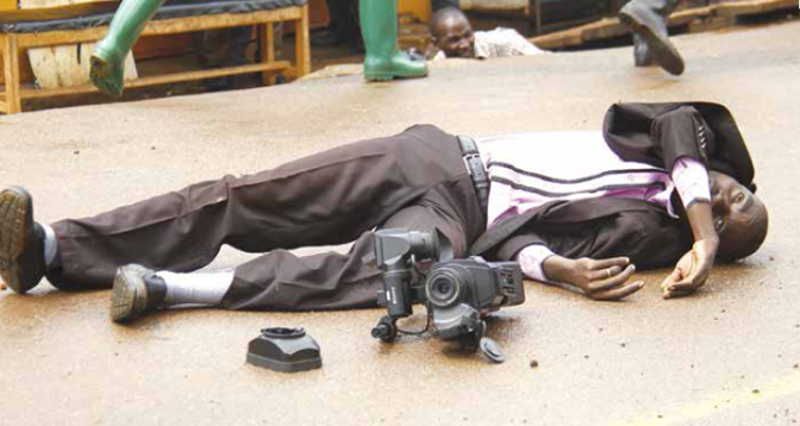

Silencing journalist who cover riots has become a major objective of the police, according to Robert Ssempala, the Coordinator of HRNJ-Uganda
More than 100 journalists assaulted by Uganda police in 2015, a setback for peace, democracy in Uganda
As the world commemorates May 3, World Press Day this week, in Uganda we remember the death of one of us and a sharp increase in violent attacks on journalists and media houses that have left over 100 of them battered more so by those entrusted with the duty of protecting life and safeguarding human rights in Uganda.
2015 opened with the death of a CBS journalist Ronald Ssembuusi whose reporting about suspected abuse of power by politicians in Kalangala district who were being investigated in the disappearance of solar panels, had earned him a one-year jail term and a fine of one million shillings by the Magistrates court in Masaka. Although Ssembuusi died on January 2, 2015 before serving his sentence, the cause of his death was linked to the trauma and hostile treatment he suffered during the course of the trial.
And while many Ugandans may not recall Ssembuusi’s ordeal and eventual passing, many at least remember the widely publicised heart-wrenching images of the brutal assault of a WBS journalist Andrew Lwanga still in January 2015 by then Old Kampala District Police Commander (DPC) Joram Mwesigye.
Mwesigye beat and severely injured Lwanga for covering a demonstration by the now defunct Poor Youth pressure group, which was considered by many in government to be a pro-opposition pressure group.
But even as Lwanga continues to battle for his life following the atrocious attack that left him with a broken spine, this incident did not stop the police and members of the general public from beating, assaulting journalists while in the line of duty.
By the end of 2015, the Human Rights Network for Journalists Uganda (HRNJ) had documented over 100 cases of assault on journalist, a worrying figure indeed not just for the media fraternity but also for the state of democracy and freedom of expression in Uganda.
The physical attacks aside, 2015 was characterised by numerous cases of intimidation of journalists, introduction and passing of policies that suppressed media freedom and free speech in the country.
As the 2015 Press Freedom Index in Uganda demonstrated, the Uganda Police Force has sadly been the lead perpetrators of violence against journalists.
HRNJ which publishes the Annual Press Freedom Index in Uganda, noted that: “The 107 cases committed by police in 2015 as compared to 40 in 2014 represented an increment in police violations by over 100%.”
Journalists and police clashed quite often in 2015 as reporters sought to record and relay events by opposition politicians to the general public apparently against the wishes of the police that has established a reputation as a pro-regime agency rather than a neutral force that safeguards human rights of all Ugandans.
As revealed by HRNJ in the 2015 Press Freedom Index titled, Political Coverage Criminalised, reporting of political events, especially those that highlight opposition politicians and their agenda, has earned the media surprising and disturbing hostility from the police, an institution that is constitutionally mandated to promote human rights including freedom of expression, association freedom of the media.
Those who seek to suppress the media from covering political events, have the agenda to deny the general public access to information, which is the oxygen of democracy.
From Lwanga’s terrible attacks to the suspension of three journalists at Jinja’s Basoga Baino (BaBa FM), to the introduction of restrictive policies to cover parliament, it is increasingly becoming clear that covering politics and other beats that seek to expose those in power, is increasingly risky and dangerous.
But even cases in which members of the general public including business people, artists and ordinary citizens that have abused, assaulted journalists, is a rude reminder that journalists face more enemies other than the police.
It is not surprising perhaps that the sharp increase in attacks on journalists and media in Uganda has earned us a negative ranking in the Global press freedom index for 2015.
The global press freedom index 2015 released by Washington based Freedom House, says that Uganda and East Africa in general have witnessed worrying declines in press freedom.
Suppression of media in many countries has often been followed horrendous human rights violations, entrenched dictatorships, famine and food insecurity as well and sometimes social unrest. It is in the interest of every Ugandan therefore to safeguard and promote freedom of the media because it is the only realistic way to constantly check the abuses of politicians, businesses and other groups whose work impacts of the common good.














Henry Lutaaya
Leave a Comment
Your email address will not be published.